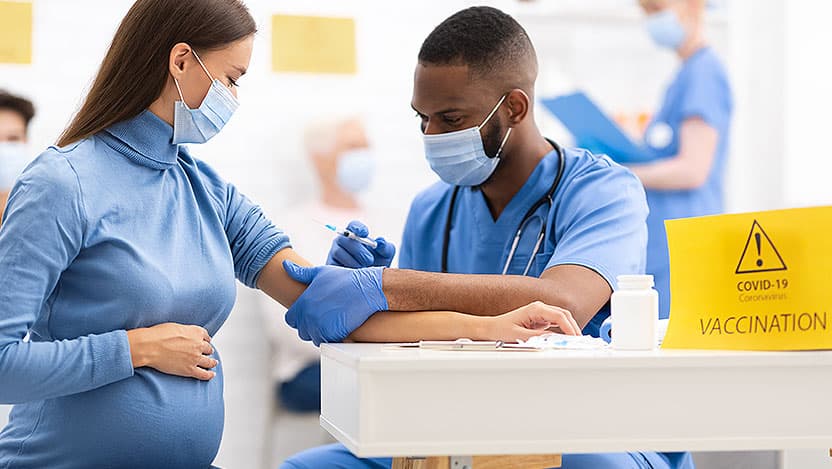COVID-19 vaccines and pregnancy: What you need to know if you're pregnant, trying to get pregnant, or breastfeeding

If you’re pregnant or trying to get pregnant, you may have questions about the effects of contracting the virus or getting vaccinated. You may also have questions about vaccination and the effects of getting COVID-19 while breastfeeding.
Knowing many new and expecting parents have questions and concerns on these topics, University of Chicago Medicine reproductive health experts — doctors specializing in general obstetrics, maternal-fetal medicine (high-risk pregnancy), and reproductive endocrinology and infertility — weigh in on what you need to know about the virus and the COVID-19 vaccine while pregnant or breastfeeding.
Are pregnant people at higher risk for COVID-19?
Pregnant people are at an increased risk of having worse outcomes if they contract a respiratory disease than when compared to the general population. That includes COVID-19, the flu or RSV. More severe outcomes may include having a more prolonged illness, being hospitalized, admission to the intensive care unit and having to be intubated (on a ventilator).
This higher risk of complications from COVID-19 while pregnant can affect the fetus you're carrying. Contracting a severe case of the virus leads to an increased risk of pregnancy complications, including preterm birth, needing a cesarean delivery, preeclampsia and postpartum hemorrhage.
These risks are even more concerning for individuals who have additional health risk factors, such as being overweight or obese, having high blood pressure or diabetes, or being part of a minority group that may experience more severe outcomes.
Today, COVID-19 is endemic rather than pandemic. This means it has a constant presence in communities — similar to the flu.
Pregnancy does not increase your risk of contracting the virus. Today, COVID-19 is endemic rather than pandemic. This means it has a constant presence in communities — similar to the flu. New strains and seasons when more people are indoors bring a spike in illness and hospitalization.
During pregnancy, while breastfeeding, and in general, the vaccine is your best protection against getting COVID-19, developing a severe infection, hospitalization and even death.
What can I do to reduce my risk of catching COVID-19 and/or preventing severe illness while pregnant?
The number one thing you can do to protect yourself from COVID-19 is get vaccinated. The COVID-19 vaccines are safe and highly effective for individuals over the age of six months, including those who are pregnant.
The vaccine presents no safety concerns to you or your baby when trying to conceive or during pregnancy, according to the CDC. There is no evidence that the vaccine impacts future fertility or that it increases the risk of miscarriage.
Although the vaccines are highly effective at preventing severe illness and death from COVID-19, it is still possible to contract the virus after vaccination. After vaccination, however, if you contract COVID-19, you will likely have a milder course.
Can I get a COVID-19 vaccine if I’m pregnant, planning to become pregnant, or currently breastfeeding?
Getting vaccinated while pregnant or breastfeeding can protect you and your baby. COVID-19 vaccination is very safe in pregnancy.
Vaccination during pregnancy protects your baby from pregnancy complications and even after birth. Similarly, to other vaccines, the antibodies your body generates after vaccination can transfer through the placenta to your baby. Infants born from mothers who get vaccinated during pregnancy are less likely to be admitted to the hospital for COVID-19 within the first six months of delivery.
Antibodies from the vaccine are passed to your baby through milk while breastfeeding as well. Research is ongoing to show how protective that is. Typically, antibodies passed through breast milk are helpful for protection.
Just like the flu vaccine, each seasonal COVID-19 vaccine protects you from the most prevalent strain at the time.
It’s important to get the updated COVID-19 vaccine each season. Just like the flu vaccine, each seasonal COVID-19 vaccine protects you from the most prevalent strain at the time. Plus, if it’s been over six months since you’ve been vaccinated, immunity from COVID-19 vaccination can wane.
When new variants circulate in your community at higher rates — during the fall and winter seasons, for example — the risk of being exposed to COVID-19 increases.
The CDC and the World Health Organization (WHO) recommend the vaccine to everyone six months of age and older, including those who are pregnant, trying to get pregnant and breastfeeding.
Speak to your healthcare provider if you have specific questions or concerns about your health status.
If I don’t get vaccinated, what are the risks of contracting COVID-19 during pregnancy?
Some of the changes your body undergoes during pregnancy can affect the strength of your immune system. While pregnant women are no more likely to contract the virus than others, being pregnant puts you at greater risk for a severe course of COVID-19. That means you have an increased risk of hospitalization, ICU admission and even death.
Severe COVID-19 symptoms also put you at a higher risk of complications during and after pregnancy, according to the CDC. Compared to asymptomatic COVID-19 patients, those with severe symptoms were at higher risk for cesarean delivery, preterm birth, stillbirth, hypertensive disorders of pregnancy and postpartum hemorrhage.
The vaccines are highly effective at preventing severe illness and death in the general population. Only a very small fraction of people who have been vaccinated end up being hospitalized for a COVID-19 infection.
Have the COVID-19 vaccines been tested in pregnant or breastfeeding people?
Studies including hundreds of thousands of people worldwide show that vaccination is safe and beneficial for pregnant and breastfeeding women — and their babies. The many benefits of getting vaccinated while pregnant or breastfeeding far outweigh any possible risks or side effects.
Do I need to delay getting pregnant or fertility treatments if I’m planning on getting vaccinated?
Current recommendations say there is no reason to delay conception or fertility treatments because of COVID-19 vaccination.
When during pregnancy should I get vaccinated?
In order to maximize protection against COVID-19, we recommend individuals get vaccinated every new season – typically in the fall around the same time as flu vaccination season.
You can get vaccinated during any trimester of pregnancy. It’s preferable to get vaccinated as soon as possible. Staying up to date with COVID-19 vaccination while pregnant means getting one dose each season.
Some people do experience a low fever after vaccination. Ask your provider about taking a pregnancy-safe fever reducer such as Tylenol if you experience a fever after getting vaccinated.
Can the vaccine affect my fetus during pregnancy?
The COVID-19 vaccine is made up of mRNA and contains no live virus. Therefore, it is impossible to contract the virus from the vaccine or spread it to others.
Vaccination during pregnancy benefits your baby. The vaccine tells your body to provide antibodies against the virus that causes COVID-19, which provides protection against the disease.
The mRNA vaccines work by presenting your body with a small set of genetic instructions for producing the SARS-CoV-2 spike protein. Your body uses these instructions to generate the protein, which allows your immune system to learn what it looks like. That way, your immune system can recognize the protein if you encounter the SARS-CoV-2 virus and prepare an immune response to keep you from getting severely sick.
Vaccination during pregnancy benefits your baby. The vaccine tells your body to provide antibodies against the virus that causes COVID-19, which provides protection against the disease. Researchers have found those antibodies in umbilical cord blood in people who have received the mRNA vaccines, indicating that the protective antibodies might pass to the baby.
Surrounding vulnerable infants with vaccinated caretakers also helps create a cocoon of protection against COVID-19.
Vaccine components or mRNA do not cross the placenta and enter the baby’s circulation. Only the antibodies produced by the pregnant person go across the placenta to protect the baby.
Will breastfeeding pass immunity on to the baby?
Multiple studies show that COVID-19 vaccines generate an immune response and an increase in antibodies found in breast milk. This supply of maternal antibodies in breast milk may provide infants protection from the illness. With other vaccinations, using the power of passive immunity to protect newborns is shown to be an effective way of preventing disease in newborns.
Breastfeeding people who have received COVID-19 vaccines have antibodies in their breast milk, which could help protect their babies.
Additionally, studies after COVID-19 vaccination show no mRNA vaccine particles in breast milk after vaccination. One of the biggest benefits of breast milk is the passive immunity the newborn receives protecting them from many infections.
If I’m pregnant and have been vaccinated, are there any additional precautions I should take?
While the COVID-19 vaccines are highly effective, no vaccine is perfect. In seasons when there is an uptick in cases, you may consider wearing a mask while in crowded indoor spaces.
If you do not get vaccinated, do your best to cocoon yourself with a small group of vaccinated people so you have the least chance of coming into contact with someone with the virus.
What should I do if I have symptoms of COVID-19 or have been exposed to the virus while pregnant?
If you have symptoms of COVID-19 or have been exposed to the virus, you should take a test — especially before coming to prenatal or ultrasound visits.
What if I test positive for COVID-19 while I am pregnant?
If you test positive for COVID-19 while you are pregnant, it's important to take appropriate steps to protect your health and the health of your unborn child.
Drink plenty of fluids to stay hydrated and get plenty of rest to help your body fight the infection. This is important for overall health and can help manage symptoms. Take medicine, like acetaminophen (Tylenol), to keep your fevers down.
Continue to follow good hygiene practices, such as handwashing, quarantining and wearing a mask if you must be around others in your household. If you have mild symptoms, wear a mask for five days around others in your household. If you have severe symptoms, wear a mask for 10 days.
Keep track of your symptoms and report any concerning changes to your healthcare provider. Common symptoms of COVID-19 include fever, cough, shortness of breath, loss of taste or smell, fatigue and body aches.
Seek immediate medical attention if you experience severe symptoms such as difficulty breathing, persistent chest pain, confusion, bluish lips or face, or other emergency warning signs.
Should I keep my prenatal appointments if I’m sick with COVID-19?
It is strongly recommended that you stay home and avoid being around other people while sick. If you believe you may have COVID-19, call your physician to discuss your symptoms and determine next steps. At UChicago Medicine, we are currently conducting many appointments via telemedicine. After a virtual visit or telephone call, we can decide if you need to come in for an appointment based on your pregnancy history and needs.
Similar principles apply to your ultrasound. Confirm with your doctor if it is necessary for you to get an ultrasound or if it can be delayed. Contact your doctor’s office immediately if you have any signs of labor, bleeding or if your baby is not moving.
Because having severe symptoms of COVID-19 leads to an increased risk of pregnancy complications, it’s important to let your doctor know if you have severe symptoms of COVID-19.
Can I transmit the virus to my fetus?
Though it is uncommon, it does appear to be possible for parents to transmit the virus to their unborn child, either just before, during or after birth, as some newborns test positive for COVID-19. Most newborns who test positive for COVID-19 experience only mild symptoms or are asymptomatic (experience no symptoms at all). Rarely, a newborn may develop a severe illness. A team of pediatricians will be available to care for your baby if any medical conditions arise.
What should I do if I have COVID-19 while breastfeeding?
Overall, the likelihood of spreading COVID-19 to your baby is very low. If you do contract the virus while breastfeeding, be sure to wear a mask while close to the baby and while breastfeeding. Wash your hands thoroughly and wash any nipples, pumps or pacifiers you and your baby use.
Even after you are no longer positive for COVID-19, and/or if other caregivers are providing care for newborns, all caregivers should wash their hands for at least 20 seconds with soap and water before touching the baby. Use a hand sanitizer with at least 60 percent alcohol if soap and water are unavailable.
You should monitor your baby for COVID-19 symptoms. Contact your physician if your baby has a fever, appears to be lethargic (overly tired), has a runny nose or cough, appears to be having difficulty breathing, is vomiting or has diarrhea.
What extra precautions is UChicago Medicine taking to safeguard pregnant and delivering patients from exposure to COVID-19?
We at UChicago Medicine monitor the number of COVID-19 cases in the area. We take additional precautions to protect our patients when there is a spike in cases.



